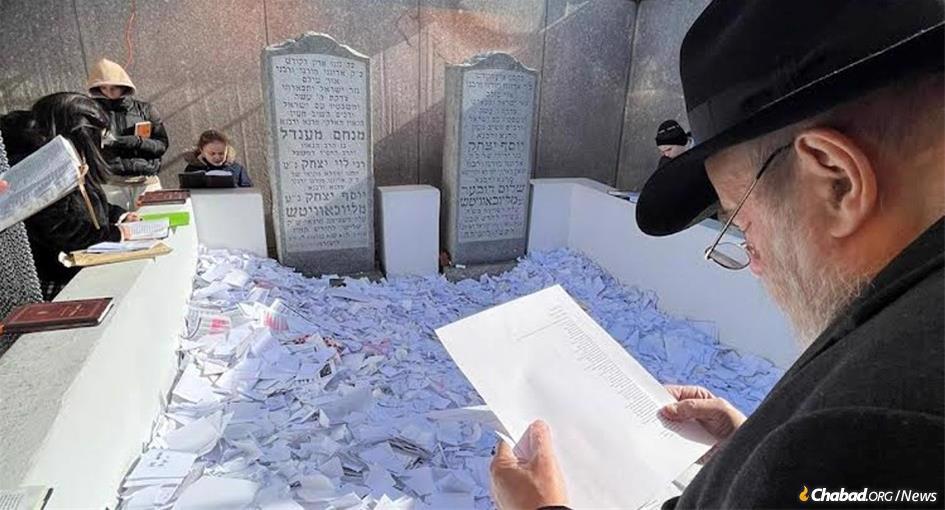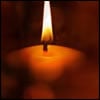It was not yet 5 a.m. on Friday, Feb. 24, when war was declared on Ukraine. Like their neighbors and friends in Kiev, Rabbi Pinchas and Dina Vishedski were asleep.
Having begun their joint career as Chabad-Lubavitch emissaries in Donetsk, they had started again in Kiev in 2014, pulling together a community of fellow refugees from the the Donbas region after sustained battles between pro-Russian separatists and the Ukrainian army made the city too dangerous a place to return to.
But even as they slept, they were not forgotten.
It was 10 p.m. on Thursday in New York, and their son, Mendel, was about to leave the complex near the Ohel, the resting place of the Rebbe—Rabbi Menachem Mendel Schneerson, of righteous memory—in Queens, N.Y.
“I had just finished giving a Tanya class in Russian in a nearby synagogue,” says Mendel, a 22-year-old student at the central Chabad yeshivah in Brooklyn. “A friend came over and told me that war had broken out. I could not believe it.”
Signaling to his friends to leave without him, Mendel stepped into the Ohel, the open-air mausoleum surrounding the modest gravestone of the Rebbe and that of his predecessor, the Sixth Rebbe, Rabbi Yosef Yitzchak Schneerson, of righteous memory.
“I stayed as long as I needed to, saying chapter after chapter of Psalms,” says Mendel. “I prayed for my parents and siblings who were once again in a war zone; I prayed for my community who had suffered so much from displacement and violence; and I prayed for all the innocent people who would soon learn they were being sucked into war.”
Mendel did not sleep that night, waiting to hear from his parents and confirm that they were OK. He continued to pray every day at the Ohel for the next five days.
During that time, his parents worked feverishly to arrange safe passage for the members of their community who wanted to leave the country.
After they had done what they could, they led one final convoy out of Ukraine, taking with them several hundred people to safety in Moldova.
And only then did Mendel stop his daily trips to the Ohel.

Tens of Thousands to Gather This Week at the Ohel
Mendel Vishedski will be returning to the Rebbe’s resting place this week when he will be among the tens of thousands who will arrive at the Ohel before or after this coming Shabbat, July 2, which marks the 28th anniversary of the Rebbe’s passing on 3 Tammuz, June 12, 1994.
And several thousand visitors, including Mendel, will remain at the visitor’s complex for the entire Shabbat, studying, praying, singing, and sharing words of inspiration and encouragement.
A native of Ukraine, the Rebbe escaped Nazi-overrun Europe to the United States, where he would remain for the rest of his life. During the second half of the 20th century, the Rebbe—widely considered the most influential rabbi of modern times—spearheaded a revival of Jewish life all over the globe.
At the same time, he took a special interest in the Jews trapped behind the Iron Curtain, sending guidance, inspiration, blessings and supplies via a stream of clandestine agents.
He was known to them as dyedushka, Russian for “grandfather,” and it happened more than once that the Rebbe broke down crying as he spoke in public about the plight of Soviet Jewry.
When chinks began to appear in the Iron Curtain, the Rebbe’s emissaries provided religious and social services for those who left to the West, and the first emissaries were sent into the Soviet Union, where they were based in Moscow and Dnipro, which would soon become part of the new country of Ukraine.
And as Jewish people all over Ukraine faced a once-in-a-generation crisis, it was natural for them to turn to the Ohel, some sending friends and family members to pray for them and others sending their petitions via email or online form.
In mid-February, as the world watched what then was a tense Russia-Ukraine standoff, Chabad-Lubavitch emissaries from across Ukraine sent a petition to the Ohel, where they requested blessings for safety and peace. It was read by Rabbi Moshe Kotlarsky, vice-chairman of Merkos L’Inyonei Chinuch, the educational arm of Chabad-Lubavitch.
A month later, when Rabbi Mordechai and Devorah Levenharts (who have since returned to Kiev) led a convoy out of the country, Devorah’s sister, Chaya, took a list with the names of nearly 50 members of their caravan to the Ohel.
The same was done by communal leaders as well as individuals, each one sending petitions with names, requests and updates throughout the four months since war has broken out.
“There is no question in my mind,” says Mendel Vishedski, “that the Ohel is where I needed—and still need—to go to pray. Not just me and not just Ukrainian Jews, but any person in need of blessing and support.”









Start a Discussion